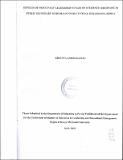Effects of Principals' leadership styles on students' discipline in public secondary schools in Nyeri Central sub county, Kenya.

View/
Date
2018-05Author
Kibanya, James Kamau
Type
ThesisLanguage
enMetadata
Show full item recordAbstract
The main purpose of a school is to provide students with an educational foundation from which they can build successful independent lives. However, there are institutional challenges that lead to disruptions in the classroom causing road blocks to student's achievement. The most common and rampant one being the student's discipline. Discipline is the readiness to obey the established rules, norms, standards or certain conditions that exist in schools to regulate students' conduct. The principal and deputy principals are of significance in fostering an academically focused school environment. Their actions form the basis of the overall mood for the school. If they consistently support teachers who implement the discipline plan and following through on disciplinary actions then teachers will follow their lead. On the other hand, if they are lax on discipline, this will become apparent over time and indiscipline will increase. This study was set to investigate the effect the principals' leadership style had on students discipline in secondary schools in Nyeri central sub-county. The study objectives were: to establish the discipline issues in the schools; to determine the extent to which the various leadership styles which include, autocratic, democratic, laissez-faire, and transformational affect student's discipline. The study adopted a descriptive survey research design. The total target population was 1850 which comprised of 16 school principals, 304 teachers and 1530 form three students from the public secondary schools in the sub-county. A simple stratified sampling technique was used to sample 10 schools out of the total 16 schools. All principals of 10 schools selected using purposive sampling were interviewed. A sample of 153 students was selected using a simple random technique from the selected schools and also 52 teachers. The study collected data from the principals using the interview method while those from teachers and students were collected using questionnaires. The data collected were analyzed using descriptive statistics and presented in percentages and frequency distribution tables. The researcher used the statistical package for social sciences (IBM SPSS) computer programme version 23 .0 to analyze the data. The crucial study findings were that discipline issues existed in schools and the most common were noise making, assignment incompletion and drug abuse. Also key in the findings was that most principals in the sub-county employed autocratic leadership style and totally disregarded other forms of leadership styles like democratic and transformational. A few of the principals applied leissez-fair leadership style in schools management. The drawn conclusion was that autocratic leadership style had a negative effect on students' discipline management and could, therefore, be attributed to many discipline cases in schools. The study recommendations were that over¬reliance of the autocratic leadership style by principals in the sub-county should be avoided, guidance and counselling department should be strengthened and be actively involved in handling discipline issues in schools, and teachers should attend a compulsory management course before promotion to a managerial position. Suggestions were that similar study should be carried out in private secondary schools for purposes of comparison. Other principals' factors such as age, gender, experience and academic qualifications should be explored to establish whether they have any effect on students' discipline. The effect of intervening factors such as mass media, home environment, peer pressure and social economic factors should be explored.
Publisher
KeMU
